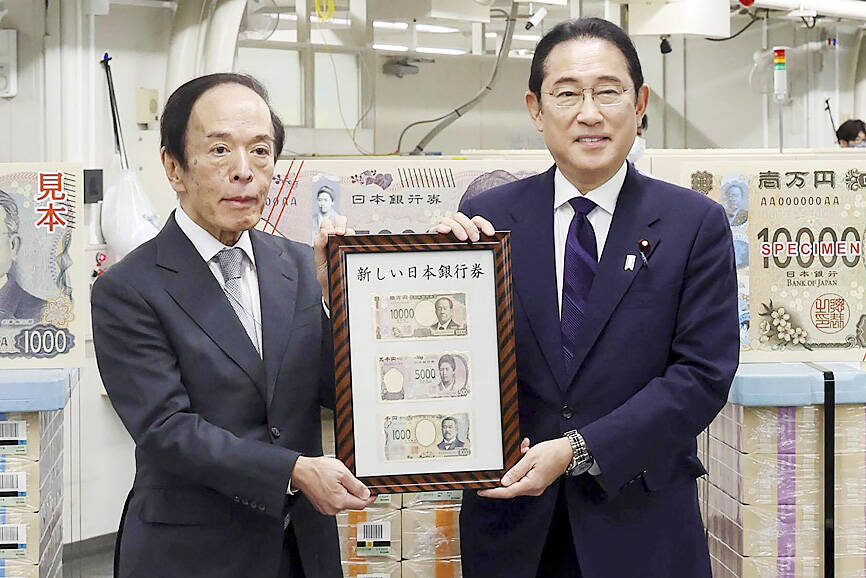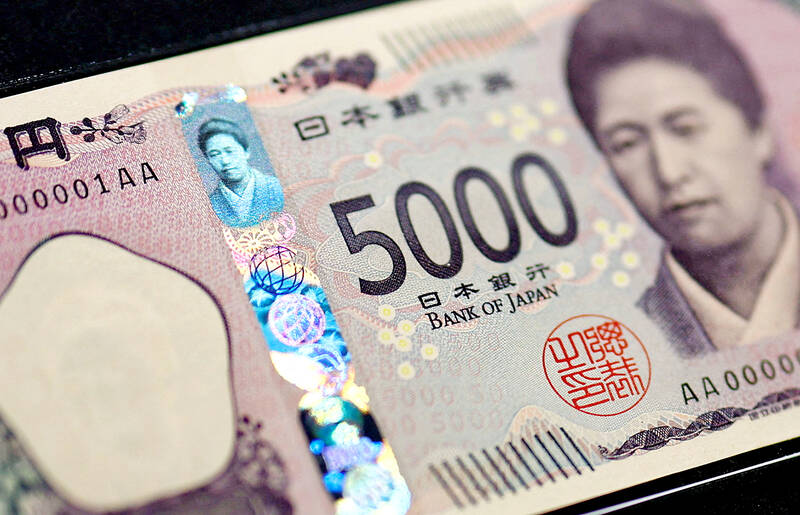Japan yesterday began circulating its first new banknotes in 20 years, featuring 3D portraits of the founders of financial and female education institutions in an attempt to frustrate counterfeiters.
The notes use printed patterns to generate holograms of the portraits facing different directions, depending on the angle of view, employing a technology that Japan’s National Printing Bureau says is the world’s first for paper money.
“Faces of those representing Japan’s capitalism, women’s empowerment and technology innovation are on the new bills,” Japanese Prime Minister Fumio Kishida said at a function.

Photo: AP
The step comes just as the economy moves into a growth-driven phase for the first time in three decades, Kishida said.
Existing bills will stay in use, but train stations, parking lots and ramen shops are scrambling to upgrade payment machines as the government pushes consumers and businesses to use less cash in its bid to digitize the economy.
The new ¥10,000 (US$62) note depicts Eiichi Shibusawa (1840-1931), the founder of the first bank and stock exchange, who is often called “the father of Japanese capitalism.”

Photo: REUTERS
The new ¥5,000 bill portrays educator Umeko Tsuda (1864-1929), who founded one of the first women’s universities in Japan, while the ¥1,000 bill features a pioneering medical scientist, Shibasaburo Kitasato (1853-1931).
While Kishida talked up the latest technology to fight counterfeiting, it is not a major problem in Japan. The 681 fake banknotes police detected last year represented a sharp drop from a record high of 25,858 in 2004.
Authorities plan to print about 7.5 billion newly designed bills by the end of this fiscal year, swelling the 18.5 billion banknotes, worth ¥125 trillion, in circulation by December last year.
“Cash is a secure means of payment that can be used by anyone, anywhere and at any time, and it will continue to play a significant role” despite alternatives, Bank of Japan Governor Kazuo Ueda said.
The central bank has experimented with digital currencies, but the government has made no decision whether to issue a digital yen.
Cashless payments in Japan have almost tripled over the past decade to account for 39 percent of consumer spending last year, but still lag global peers and should rise to 80 percent to boost productivity, the government has said.
Nearly 90 percent of bank ATMs, train ticket machines and retail cash registers are ready for the new bills, but only half of restaurant and parking ticket machines, the Japan Vending Machine Manufacturers’ Association said.
Almost 80 percent of the nation’s 2.2 million drink vending machines also need upgrades, the association said.

Semiconductor shares in China surged yesterday after Reuters reported the US had ordered chipmaking giant Taiwan Semiconductor Manufacturing Co (TSMC, 台積電) to halt shipments of advanced chips to Chinese customers, which investors believe could accelerate Beijing’s self-reliance efforts. TSMC yesterday started to suspend shipments of certain sophisticated chips to some Chinese clients after receiving a letter from the US Department of Commerce imposing export restrictions on those products, Reuters reported on Sunday, citing an unnamed source. The US imposed export restrictions on TSMC’s 7-nanometer or more advanced designs, Reuters reported. Investors figured that would encourage authorities to support China’s industry and bought shares

FLEXIBLE: Taiwan can develop its own ground station equipment, and has highly competitive manufacturers and suppliers with diversified production, the MOEA said The Ministry of Economic Affairs (MOEA) yesterday disputed reports that suppliers to US-based Space Exploration Technologies Corp (SpaceX) had been asked to move production out of Taiwan. Reuters had reported on Tuesday last week that Elon Musk-owned SpaceX had asked their manufacturers to produce outside of Taiwan given geopolitical risks and that at least one Taiwanese supplier had been pushed to relocate production to Vietnam. SpaceX’s requests place a renewed focus on the contentious relationship Musk has had with Taiwan, especially after he said last year that Taiwan is an “integral part” of China, sparking sharp criticism from Taiwanese authorities. The ministry said

US President Joe Biden’s administration is racing to complete CHIPS and Science Act agreements with companies such as Intel Corp and Samsung Electronics Co, aiming to shore up one of its signature initiatives before US president-elect Donald Trump enters the White House. The US Department of Commerce has allocated more than 90 percent of the US$39 billion in grants under the act, a landmark law enacted in 2022 designed to rebuild the domestic chip industry. However, the agency has only announced one binding agreement so far. The next two months would prove critical for more than 20 companies still in the process

CHANGING JAPAN: Nvidia-powered AI services over cellular networks ‘will result in an artificial intelligence grid that runs across Japan,’ Nvidia’s Jensen Huang said Softbank Group Corp would be the first to build a supercomputer with chips using Nvidia Corp’s new Blackwell design, a demonstration of the Japanese company’s ambitions to catch up on artificial intelligence (AI). The group’s telecom unit, Softbank Corp, plans to build Japan’s most powerful AI supercomputer to support local services, it said. That computer would be based on Nvidia’s DGX B200 product, which combines computer processors with so-called AI accelerator chips. A follow-up effort will feature Grace Blackwell, a more advanced version, the company said. The announcement indicates that Softbank Group, which until early 2019 owned 4.9 percent of Nvidia, has secured a